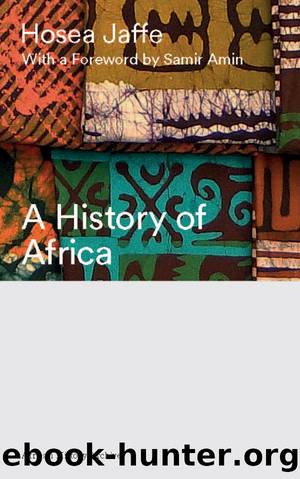A History of Africa by Hosea Jaffe

Author:Hosea Jaffe
Language: eng
Format: epub
Publisher: National Book Network International
Published: 2017-07-14T16:00:00+00:00
The Imperialist Missionaries
’The role of the missionaries in conquest’ is the subject of several African histories. The success of this role may be measured by the paucity of works on the role of the missionaries after conquest which is in fact more pertinent to the liberation movements. The missionaries were land and labour seizing organizations of feudal-capitalist European churches. They converted tribal usufruct into illegal private property for their missions, often for themselves (on a grand scale, in the Portuguese African empire), and for European companies and settlers. They broke down tribal loyalties to chiefs by means of commerce, the Bible and deception. They divided tribes internally, exploiting intertribal divisions or creating new ones, to the point of war. Nearly all were linked with the Crown or with governors and conquistadores. Their missions served as military bastions, which accounts for their frequently strategic situations. They functioned as ‘divide and rule’ recruiting stations. During and after conquest they became cheap labour training depots. They founded the entire segregationist educational system of South Africa and Rhodesia, which still has not changed. They dominated the minds of the conquered peoples through their churches and suppressed breakaway movements like the Ethiopian Church. They raised fratricidal ‘divide and rule’ conflicts between Christians and Muslims in Uganda, the Sudan, ‘Ibolanď and Senegal. But they never struck deep roots in Africa’s soil, nor did they become a part of Africa as Islam did, on account of their colonialist and racialist character, manifested not only during conquest but in almost every strike, peasant rebellion and liberation war described above or in the chronology of the 20th Century. They tried always to divide, break, confuse and diffuse every organization that they could infiltrate, frequently by the creation of rival bodies. For the missionaries, playing ‘liberation’ is an old colonialist game. They played it, and still do, in Southern Africa, Angola, Mozambique, Sudanese Azania, Uganda, Namibia and Zimbabwe. In particular, they ‘educated’ many of the leaders of liberation movements and through ‘aid’ exploit famines and droughts caused by imperialistic underdevelopment They appoint African bishops as collaborators. The structure of the Anglican and Catholic churches, in particular, is imperialistic, with theocratic governments in Canterbury and Rome respectively. In the case of the Vatican, this theocracy is a ruling class and state at the same time, with 250 million ‘citizens’ in Europe, North America and among the colons of Central and South America, and with 500 million ‘subjects’ in the Americas, Africa and Asia. The Vatican state-class owns capital property on a vast international scale, and is the apex of a secular and spiritual empire.
One of the most important, but most hidden, forms of resistance to primary accumulation was the anti-missionary and anti-Christian stand of the chiefs, kings, merchants, slaves and commoners in the old tribes or kingdoms. Fadiouth, in Senegal, was the very first properly organized Christian mission in Africa. Christianity there is about 500 years old, as old as the slave traffic with which it arrived in the 15th Century.
Download
This site does not store any files on its server. We only index and link to content provided by other sites. Please contact the content providers to delete copyright contents if any and email us, we'll remove relevant links or contents immediately.
| Arms Control | Diplomacy |
| Security | Trades & Tariffs |
| Treaties | African |
| Asian | Australian & Oceanian |
| Canadian | Caribbean & Latin American |
| European | Middle Eastern |
| Russian & Former Soviet Union |
The Secret History by Donna Tartt(16608)
The Social Justice Warrior Handbook by Lisa De Pasquale(11485)
Thirteen Reasons Why by Jay Asher(7782)
This Is How You Lose Her by Junot Diaz(5753)
Weapons of Math Destruction by Cathy O'Neil(5029)
Zero to One by Peter Thiel(4816)
The Myth of the Strong Leader by Archie Brown(4785)
Promise Me, Dad by Joe Biden(4440)
Stone's Rules by Roger Stone(4412)
Beartown by Fredrik Backman(4403)
How Democracies Die by Steven Levitsky & Daniel Ziblatt(4392)
The Fire Next Time by James Baldwin(4336)
100 Deadly Skills by Clint Emerson(4070)
A Higher Loyalty: Truth, Lies, and Leadership by James Comey(4024)
Rise and Kill First by Ronen Bergman(4008)
The David Icke Guide to the Global Conspiracy (and how to end it) by David Icke(3875)
The Farm by Tom Rob Smith(3869)
Secrecy World by Jake Bernstein(3773)
The Doomsday Machine by Daniel Ellsberg(3725)
